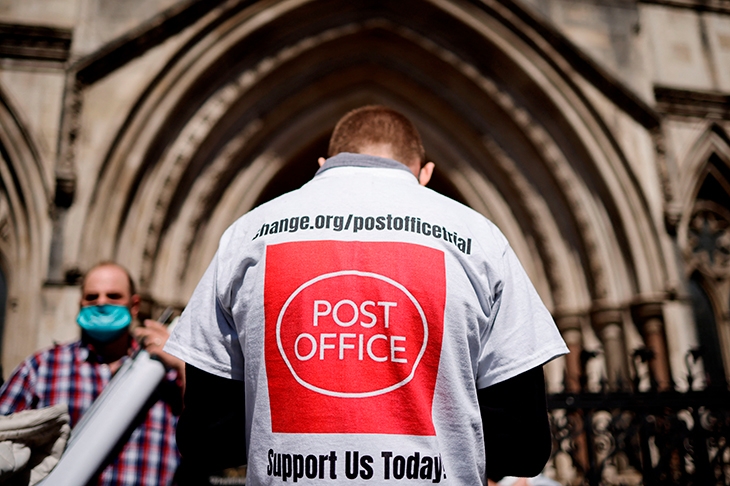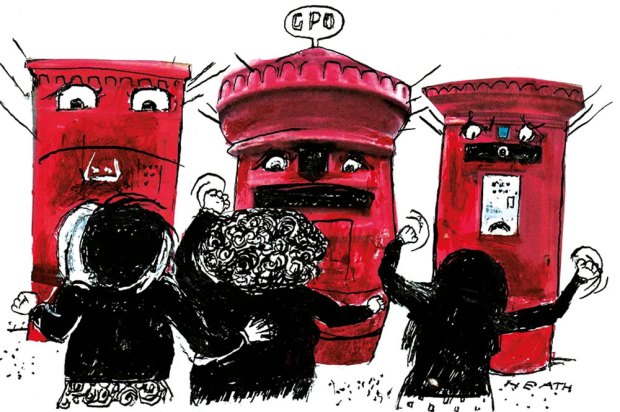The alleged frauds for which the Post Office prosecuted no fewer than 736 of its sub-postmasters has turned out in almost all cases to be the result of faults in a computer system called Horizon which Post Office managers and the system’s supplier, Fujitsu of Japan, were reluctant to acknowledge. That’s the short summary of a miscarriage of justice which also looks like a case of mismanagement to the point of delusion: how could anyone believe a copy-cat crime wave on this scale was sweeping through a cohort of small businesspeople generally seen as the most upstanding of local citizens? And if that wasn’t the belief, the only other explanation is worse: cynical concealment of a 15-year IT cock-up for which no one was willing to carry the can.
Paula Vennells, the Post Office’s chief executive from 2012 to 2019, when victims of this scandal were fighting to be heard, has stepped down from all her public roles and directorships, even from her Church of England curacy, to avoid becoming a ‘distraction’ — a gesture of atonement which should not be taken as anything like a complete answer to the question of who’s to blame. A whole generation of Post Office executives, board members and the ministers to whom they were accountable have their fingerprints on the file.
Most importantly, Fujitsu has so far failed to give a proper account of itself. Vennells says she was consistently assured ‘from the highest levels of the company’ that Horizon, though ‘not perfect’ was ‘fundamentally sound’; only this month, her successors awarded Fujitsu a £42 million extension to the Horizon contract. Yet Mr Justice Fraser — in a 2019 High Court ruling in the sub-postmasters’ favour which preceded last week’s quashing of 39 convictions by the Court of Appeal — referred the case to the Director of Public Prosecutions on the basis of his ‘very grave concerns regarding veracity of evidence given by Fujitsu employees… about the known existence of bugs, errors and defects’ in Horizon. The Post Office should hang its collective head in shame but the spotlight of justice, I suggest, rests on the supplier of the system that ruined so many innocent lives.
Tough gig in Zurich
Good luck to António Horta-Osório, who is leaving London after a decade running Lloyds Banking Group to become chairman of Credit Suisse in Zurich. Crippled by its 2008 merger with Halifax Bank of Scotland, bailed out by the Treasury, stained by industrial-scale PPI mis-selling, Lloyds was wrestled back to profit and private-sector ownership by the Portuguese-born banker — who himself survived a bout of nervous exhaustion and a spot of tabloid-alleged trouser trouble to become, as the FT put it, ‘a pillar of the British establishment’. I observed that elevation from my own down-table position at a Mansion House dinner in 2015, as Horta-Osório hobnobbed with the likes of Lord (Jim) O’Neill of Goldman Sachs and Tony Hayward (ex-BP) before one-upping all other bankers present to sit at Governor Carney’s right hand.
You might think, after the rigours of Lloyds, he’d prefer to ease into a portfolio of grandee roles (he’s already chairman of the Wallace Collection) rather than tackle Credit Suisse — the bank most of us would least like to work for these days, what with its potential losses on Greensill Capital and the collapsed Archegos ‘family office’ as well as its poisonous internal politics and languishing share price. Becoming a pillar of Zurich’s closed establishment will be a tougher gig, I suspect, than winning favour in London. Horta-Osório says he hopes to join the Swiss city’s exclusive Grasshopper tennis club: he’d better brace himself for furious serves from Credit Suisse shareholders.
Never mind the ads
How excited am I that Apple has introduced a feature into iPhones and iPads to impede the likes of Facebook from tracking my web activity and presenting me with adverts to match? Not a whole lot, to be frank. Sometimes it’s creepy when the whim of a momentary Google search generates ads that interrupt Facebook’s chitchat; sometimes it’s quite useful. I was more upset when the only time I ever bought something on eBay and paid for it via PayPal, I was immediately subjected to repeated phishing attacks. And I’m much more offended when pseudonymous nutters post abusive comments under the online version of this column. The internet is to the 21st century what electrification was to the 20th and sewer-age to the 19th: a fundamental advance in civilisation. But it’s also a monster beyond control that releases the lowest of human nature. Tiresome targeted ads are the least of the problem. Caveat emptor.
Put those vowels back
Dontcha just hate the rebranding of investment giant Standard Life Aberdeen as ‘Abrdn’ — designed, we’re told, to suggest an outfit that’s ‘dynamic’ and ‘digitally enabled’. Others have pointed out that it also follows a trend set by a singer and former Strictly contestant who calls himself ‘HRVY’. Even more irritating, the new formulation is pronounced exactly like Scotland’s granite city — so why eliminate the Es? Has someone declared vowels to be symbols of white male privilege?
What’s not surprising is that the author of this horror is the brand consultancy Wolff Olins, a generator of so much hot air that it really ought to be picketed by Extinction Rebellion. Jarring rebrands — most famously Royal Mail’s brief, howled-down adoption of ‘Consignia’ — suggest inner turmoil rather than positive confidence. But in this case we’re also told the weird spelling will ‘create unity’ by replacing several existing brands across the group — a reminder that during an extended top-floor power struggle following the 2017 merger of Standard Life and Aberdeen Asset Management, City wags dubbed the unhappy new venture ‘Stab-erdeen’. That was much more memorable.
Got something to add? Join the discussion and comment below.
Get 10 issues for just $10
Subscribe to The Spectator Australia today for the next 10 magazine issues, plus full online access, for just $10.
You might disagree with half of it, but you’ll enjoy reading all of it. Try your first month for free, then just $2 a week for the remainder of your first year.















Comments
Don't miss out
Join the conversation with other Spectator Australia readers. Subscribe to leave a comment.
SUBSCRIBEAlready a subscriber? Log in